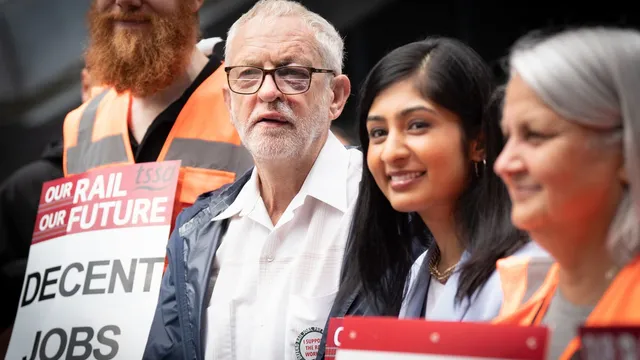
Zarah Sultana plans new party with Jeremy Corbyn to challenge the government
2025-07-06 10:17- Zarah Sultana plans to create a new left-wing party with Jeremy Corbyn.
- The party aims to address issues like poverty and foreign policy based on peace.
- The development could significantly shift political dynamics, challenging Labour's traditional voter base.
Express your sentiment!
Insights
In the United Kingdom, Zarah Sultana, an independent MP, recently revealed her intention to establish a new left-wing political party alongside former Labour leader Jeremy Corbyn. This announcement came amid growing discontent toward the current government and a perceived shift of the Labour Party to the right under Keir Starmer's leadership. Sultana criticized the government for its handling of disability benefits and stated that traditional parties have repeatedly failed the people. The formation of this new party is seen as a response to the social and economic challenges facing many in the UK, particularly in light of recent welfare policy debates. Corbyn expressed on the ITV show Peston that there is a significant need for a left alternative within British politics, highlighting the formation of an Independent Alliance parliamentary faction. Both Corbyn and Sultana aim to bring together like-minded independents and push a socialist agenda focused on poverty reduction and foreign policies centered around peace. This new political alliance counters the narratives put forth by more established parties, which Sultana claims serve the interests of billionaires rather than the populace. This initiative builds on the momentum gathered by a group of pro-Gaza independents who emerged during the general election in 2024, demonstrating a potential power shift on the left side of the political spectrum. Polls conducted prior to Sultana's announcement had already suggested that a party led by Corbyn could capture 10% of the vote, pulling support from Labour and other progressive movements. Engagement and interest in the new party have been strong, with over 14,000 sign-ups on social media shortly after the announcement. The potential launch of Corbyn and Sultana’s political party also opens the door for other discontented elements within Labour and could attract support from constituents dissatisfied with the current political landscape. This development poses a challenge to the Labour Party's existing support base, particularly in constituencies with significant young or activist populations. As the UK navigates these turbulent political times, the impact of this new party formation remains to be seen.
Contexts
The emergence of new political parties in the United Kingdom has led to significant dynamism in the nation's political landscape. These parties often arise in response to perceived shortcomings in the existing political environment or to represent specific interests and demographics that traditional parties may overlook. The rise of parties such as the Scottish National Party (SNP), Plaid Cymru, and more recently, smaller groups like the Green Party and various independent political movements, exemplifies this shift. These newer entities have not only diversified the perspectives present in parliamentary discussions but have also introduced fresh debates on issues ranging from regional autonomy to environmental policy and social justice. This shift is indicative of a growing disenchantment with established political parties, prompting citizens to seek alternative representation that aligns more closely with their views and priorities. The impact of these new parties on electoral outcomes has been profound, particularly in the context of the UK's first-past-the-post voting system. This system often sidelines smaller parties; however, the growing popularity of parties like the SNP in Scotland has illustrated the potential for successful regional parties to gain substantial influence. As these parties have won seats, they have been able to amplify calls for autonomy or specific regional interests, reshaping the dialogue at both the national and regional levels. Concurrently, the rise of the Green Party has forced larger parties to adopt more robust policies on climate change and environmental protection, which has been a key concern of the electorate, particularly among younger voters. Another significant effect of new political parties is their role in shaping political discourse. They often bring attention to niche issues that may not be adequately addressed by larger parties, providing a platform for marginalized voices and concerns. For instance, the resurgence of left-leaning parties has reinvigorated discussions around wealth distribution, workers' rights, and social equity in the UK, compelling the Labour Party and even Conservative factions to recalibrate their platforms to capture disillusioned voters. Furthermore, the presence of these parties has encouraged broader participation in the democratic process, as citizens feel more represented and see a wider variety of choices in elections. Despite their successes, the future of new political parties in the UK remains uncertain, particularly as they grapple with challenges such as limited resources and media exposure compared to their larger counterparts. The political landscape is also influenced heavily by ongoing events like Brexit and the shifting economic climate, which could either bolster the relevance of these smaller groups or lead to fragmentation that dampens their influence. Nonetheless, the presence of new political parties in the UK has changed the way politics is perceived and practiced, creating opportunities for greater voter engagement and responsiveness within the political system.